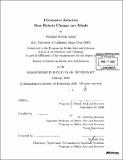Persuasive robotics : how robots change our minds
Author(s)
Siegel, Michael Steven
DownloadFull printable version (29.94Mb)
Alternative title
How robots change our minds
Other Contributors
Massachusetts Institute of Technology. Dept. of Architecture. Program in Media Arts and Sciences.
Advisor
Cynthia Breazeal.
Terms of use
Metadata
Show full item recordAbstract
This thesis explores the extent to which socially capable humanoid robots have the potential to influence human belief, perception and behavior. Sophisticated computational systems coupled with human-like form and function render such robots as potentially powerful forms of persuasive technology. Currently, there is very little understanding of the persuasive potential of such machines. As personal robots become a reality in our immediate environment, a better understanding of the mechanisms behind, and the capabilities of, their ability to influence, is becoming increasingly important. This thesis proposes some guiding principles by which to qualify persuasion. A study was designed in which the MDS (Mobile Dexterous Social) robotic platform was used to solicit visitors for donations at the Museum of Science in Boston. The study tests some nonverbal behavioral variables known to change persuasiveness in humans, and measures their effect in human-robot interaction. The results of this study indicate that factors such as robot-gender, subject-gender, touch, interpersonal distance, and the perceived autonomy of the robot, have a huge impact on the interaction between human and robot, and must be taken into consideration when designing sociable robots. This thesis applies the term persuasive robotics to define and test the theoretical and practical implications for robot-triggered changes in human attitude and behavior. Its results provide for a vast array of speculations with regard to what practical applications may become available using this framework.
Description
Thesis (S.M.)--Massachusetts Institute of Technology, School of Architecture and Planning, Program in Media Arts and Sciences, 2009. Includes bibliographical references (p. 169-174).
Date issued
2009Department
Program in Media Arts and Sciences (Massachusetts Institute of Technology)Publisher
Massachusetts Institute of Technology
Keywords
Architecture. Program in Media Arts and Sciences.